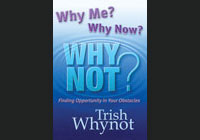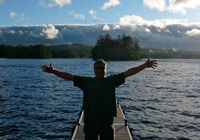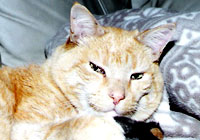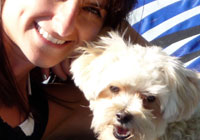
When training to be a ski instructor one of the first things they did was observe us through a magnifying glass to strip us of our bad habits. It was both humbling and gratifying. Of course we wanted to know about anything that was preventing us from being better skiers. At the same time, it was imperative to the reputation of the ski school that we model good habits for their students.
Looking back, I can equate my “bad habits” to times when I was in “survival mode.” They were the techniques I had adopted to avoid falling versus to enjoy skiing.
You are reading this because you want to enjoy living. I am writing this because I want that for us, too. You might think you are already good at it and you probably are, but, as with any skill, there’s always room for improvement. In the mastery we experience the oneness. In learning the art of carving my turns—riding the skis, at one with the snow—skiing took on a whole new dimension for me. With commitment, discipline and practice, rather than muscling through a run, I found myself descending with a newfound grace.
Oneness is an orgasmic feeling.
This next concept may reveal something that’s been preventing you from living and loving with grace. It will  likely be a bit of an ego bust initially. I've learned, during times such as this, that it can be helpful to remind yourself of your bottom line. In this case, that you want to do better and be better when it comes to living and loving. Oneness is calling and you are being invited to heed Its call.
likely be a bit of an ego bust initially. I've learned, during times such as this, that it can be helpful to remind yourself of your bottom line. In this case, that you want to do better and be better when it comes to living and loving. Oneness is calling and you are being invited to heed Its call.
When my husband and I were in our early 30’s with a young family, he developed cancer. Two years after he was clear of it, I fell apart. I had done my best to hold it together for him and for our 3 children, 6 and under. Once that task was complete it was my turn for support. I found myself afraid to love him again, so I sought counseling. It was really helpful until it wasn’t. Looking back, that period was traumatic. When in survival you don't see that. In our last session together, my counselor tried to tell me how to talk to my husband regarding a particular incident. My response, “I know what to say, but what do I do with all these feelings?” She didn’t have an answer so I went in pursuit of one. I wasn't content with a puppet show for a relationship.
In my pursuit of truth and love I was divinely guided. I didn’t know it at the time but I can see it clearly now. A wise inner voice responded with a different interpretation of events and guidance. What I needed seemed to find its way to me: books proverbially fell off shelves, people crossed my path who were offering just what I needed, and thought-provoking ideas popped up where least expected.
The first time I heard the concept I’m about to share was at the end of a yoga class in the early 90’s. I remember the instructor being skeptical. I'm so glad she shared it anyway. I took it to heart and was not disappointed.
“The things that irritate us most in others are the things we don’t like about ourselves.” ~Author Unknown
Initially it would be the last place I would look yet the perspective that would bring me closer every time I felt like we couldn’t be further apart. I’d start with trying to change my husband. We all know that never works but it doesn’t stop us from trying. Then I’d try to be like him. It wouldn’t seem to bother him and it didn’t make me feel good about myself so scratched that. Then I’d remember the quote. How might I be unknowingly similar? Bingo! My findings would humble me, my irritation would transform into compassion and bring me closer every time.
 My bad habits had created distance. Even with this knowing, I didn’t fully embrace this idea until years later. Why not? My ego would rather be right than have me be happy. This concept came back around for me when I became curious about the Bible. In my studies I came across the biblical version in Matthew 7:3-5.
My bad habits had created distance. Even with this knowing, I didn’t fully embrace this idea until years later. Why not? My ego would rather be right than have me be happy. This concept came back around for me when I became curious about the Bible. In my studies I came across the biblical version in Matthew 7:3-5.
3 “Why do you look at the speck of sawdust in your brother’s eye and pay no attention to the plank in your own eye? 4 How can you say to your brother, ‘Let me take the speck out of your eye,’ when all the time there is a plank in your own eye? 5 You hypocrite, first take the plank out of your own eye, and then you will see clearly to remove the speck from your brother’s eye.
It was the term hypocrite that got my attention. I would never want to be a hypocrite. So now, when I feel triggered, I step away to feel it: share it with someone with a trained eye, or sit with it in meditation or journal about it. Once enough of the emotion has been released, I can think to ask my wise inner guidance, “What’s my plank?” And when I ask, I’m always shown how I’m unknowingly similar.
This concept brings a lightness to my circumstances and makes me laugh to know that if I listen to my ego and continue down the road of blame and shame that it will make me a hypocrite. Who would want to master hypocrisy? And maybe we’re right that the other person is wrong but if we’re doing our own version of the same thing how can we ask others (who have come to show us ourselves) to change? We have to be the change we wish to see in the world, as Mahatma Gandhi so eloquently reminds us. Welcome to the human experience.
I had a career change from the field of business to holistic counselor and coach because of these concepts  I’m sharing with you. Similarly to wanting to teach skiing because I enjoyed the sport, I wanted to teach people who wanted to learn about the joys of life and love that I was experiencing. I value having a trained eye to sit with and wanted to be that for others. 25 years later I’m still learning and growing and enjoying sharing. I started out in kindergarten and now I’m in the mastery program.
I’m sharing with you. Similarly to wanting to teach skiing because I enjoyed the sport, I wanted to teach people who wanted to learn about the joys of life and love that I was experiencing. I value having a trained eye to sit with and wanted to be that for others. 25 years later I’m still learning and growing and enjoying sharing. I started out in kindergarten and now I’m in the mastery program.
If you are in the throes of an abusive situation it may be necessary to separate in an effort to find your footing. Get help. Also remember that separating, alone, is not the solution. You will recreate a similar situation with the same person or someone else if you don’t learn from it / if you don’t somehow change / own how you unknowingly contributed.
You can emerge from something more whole, and even grateful without ever wanting to go through anything remotely similar ever again. It's a great feeling to get out of survival mode and realize you got it this time—you broke the habit—rather than defending yourself you opened your fists to receive the value. You're being the change. Nothing begins as a crisis but it can take a crisis to get our attention.
Sometimes when we see ourselves in another person, and accept ourselves where we stand, we can accept the other person as well. There’s that too.
A simple example:
Say your partner is controlling: at certain times telling you what to do and how to do it—maybe around spending money—and it drives you crazy. As you sit with it: talk with a trained eye and ear, meditate or journal about it, you realize that you control at times too. You just do it passively: your tendency is to withhold information in an effort to keep the peace—maybe hiding some of your purchases.
Fear fuels control. If becoming aware that withholding information is enough for you, then you can accept your partner’s controlling nature with a newfound lightness: things we do when scared.
 If you find yourself wanting to do better, wanting to come from love rather than fear, then you will get some help with learning to turn that around—perhaps a book, a course or a counselor. Controlling your controlling behavior or your partner’s won’t work. You can’t take what caused a disconnect to fix a disconnect.
If you find yourself wanting to do better, wanting to come from love rather than fear, then you will get some help with learning to turn that around—perhaps a book, a course or a counselor. Controlling your controlling behavior or your partner’s won’t work. You can’t take what caused a disconnect to fix a disconnect.
Sometimes we feel like a victim and it's important to admit when we do and to feel the feelings it stirs. My hope is that you will take this concept to heart so that it can be as transformational for you as it has been and still is for me.
Friends in this Love,
Trish















Hi Trish,
I thoroughly enjoyed your Love Letter! Thank you for being vulnerable and transparent. I will be more mindful of this concept.
Kindly,
Cheryl
Hi Cheryl,
Thank you for commenting. "Love Letter," what a great description! You are most welcome. From studying the Bible I realized that 'wise voice' is the Holy Spirit.
Enjoy putting this into practice.
Warmly,
Trish
Yes, Trish, I too believe that the “wise voice” is the Spirit of God. I LOVE that name…Thank you! May we both listen for and heed it more earnestly.
My son has OCD of contamination and hoarding. For years I have been expecting him to change. I want him to clear our kitchen table and our garage. And he has promised several times to do so, but things keep getting worse. Out of frustration, I said to him, on different occasions, “Why do you…?” Recently, it got to the point where we couldn’t open our garage door. I was so stressed out that I couldn’t breathe. In search or a relief or a solution, I began to talk to Trish and another close friend Sue about my son and myself. It occurred to me more clearly than ever before: I have OCD myself, OCD of contamination. I wash our groceries before putting them in the fridge; I wipe chairs and door knobs after a visitor leaves; I strip myself of outwears and change into PJs before sitting on our couch… I
can’t change and stop, and yet I expect my son to change. I see his plank in the eye and something wrong with him while oblivious to my own bad habits.
In an attempt to help him, I quickly put together a list that I think would work. Taking a second look at the list, I see there are items he wouldn’t try and others that I can’t convince myself of their effectiveness.
I remember one of the things Trish said to me during our recent conversations: gentle love and acceptance. The readings I did in the past few days are all in line with that valuable advice from Trish. Love is the answer. I thought I loved my son, but unwittingly I must have added to his stress and exacerbated his OCD by trying to change him or control him. With is new realization, I have been trying to really support him by pausing and stopping my habitual urge to say, “You should…”; instead, I say, “Ok. ..” Also, I mindfully send him positive, encouraging words from time to time. After all, he inherited OCD from me; I got it from my dad.
Grace,
Thank you for your candid sharing. Love IS the answer! Beautiful takeaway!
Don't forget to give it to yourself when you catch yourself in the habit. The hand over heart and belly meditation is great for interrupting the pattern.
Here is the link to the meditation with some great information describing it. https://www.trishwhynot.com/blog/ho-ho-hoa-holiday-meditation/
I think you'll find it helpful.
Thank you for your valuable commenting.
Friends in this Love,
Trish
Hi Trish,
I'm eager to go find, and remove, more planks.
Thanks!
Scott
WooHoo! You've acquired a taste for humble pie!
Congratulations!
Trish
This is such a powerful reminder. It mkes me think of Richard Bach's book, ONE, where he explored the idea that we are all reflections of/alternate versions of each other.
That idea helps me have more compassion, not just for others, but for myself, which in turn allows me to examine, and remove, my own planks when necessary.
Thanks for sharing.
Love Richard Bach. I quoted him in my book. I have not read "ONE," but I definitely resonate with that idea so I'll have to check it out. Thanks for the reference and for adding dimension to my post with your takeaway!
You are most welcome!
My mom sends me a text last night, "We went to get dads medicine and now we are going for a ride." This was followed with a heart emoji. "A ride" is code for the Casino. At least I got a text. Often I just have to guess, after a couple of hours of disappearance, they are at the Casino.
This whole disappearance act, and hiding the fact, and then when they come home (usually 6 to 10 hours later), they act like nothing has happened. I, of course, am infuriated! I have sat with this so many times, mainly because it happens so often, that I am required to sit with it to keep my sanity.
I continue to ask myself, "What is my own version of a disappearance act." (Maybe this is not the right question to ask myself?)
Lots of answers come to me. I can see how I have hurt people. But no matter what, I still struggle finding compassion for my parents disappearing act to help me let go of this feeling.
Hi Audra,
Sounds like you can see how you’ve been similar. Maybe it’s your ego wanting to be right rather than happy that needs confronting? You said, “Of course I’m infuriated.” That’s suggesting you’re right. I’d suggest “how interesting” rather than “of course.” Be curious rather than justified.
I hope this helps. This issue might benefit from a session.
Friends in this Love,
Trish